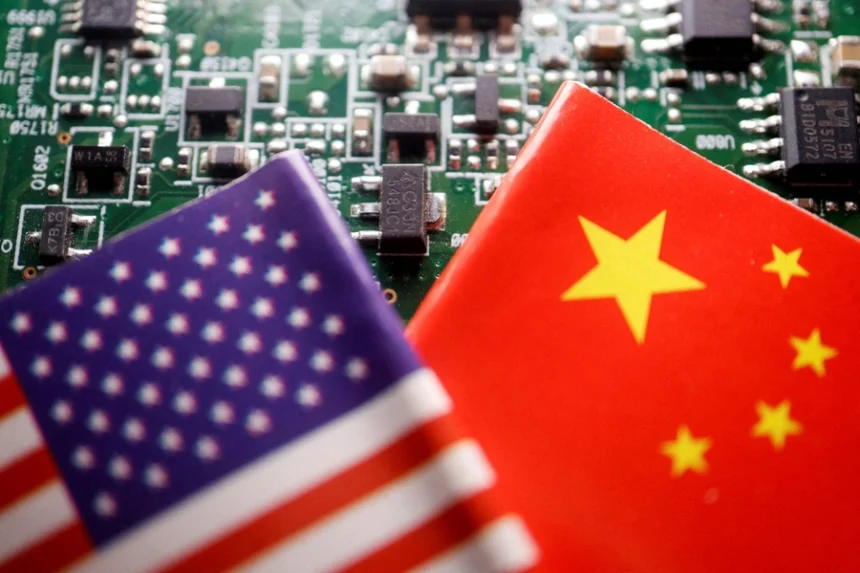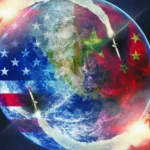As tensions continue to rise in the realm of global technology and geopolitics, the United States is reportedly preparing a new wave of actions aimed at limiting advanced chip production in China — including targeting the operations of semiconductor plants run by allied nations within Chinese borders. According to a recent report by The Wall Street Journal, the Biden administration is considering implementing additional restrictions that would tighten the noose on China’s access to cutting-edge chip manufacturing technologies, extending even to non-U.S. companies operating in the country.
This move, if finalized, would mark a significant escalation in Washington’s efforts to curb Beijing’s technological ambitions, particularly in the fields of artificial intelligence (AI), quantum computing, and military applications. It also puts the spotlight on companies from U.S. allies — such as South Korea and Taiwan — whose advanced chip fabrication plants (fabs) continue to operate on Chinese soil.
The Strategy Behind the New Measures
The Biden administration has maintained and expanded upon the strategic export controls originally implemented during the Trump era, with a central goal of stalling China’s advancement in critical technologies. While the United States has already restricted domestic firms and U.S.-origin technology from being used to supply Chinese entities, the next logical step involves international coordination — pressuring foreign semiconductor giants to comply with Washington’s broader vision of techno-containment.
According to The Wall Street Journal, the administration is now considering denying licenses that would allow companies such as Samsung Electronics Co. and Taiwan Semiconductor Manufacturing Co. (TSMC) to continue operating and upgrading their advanced fabs in China. Both firms currently manufacture chips in China — Samsung in Xi’an and TSMC in Nanjing — with a focus on relatively advanced (though not the most cutting-edge) semiconductor nodes.
The U.S. Commerce Department is reportedly discussing whether to let these license exemptions lapse or impose tighter conditions when they come up for renewal. These exemptions had previously allowed Samsung and TSMC to continue shipping U.S.-origin equipment and technology to their facilities in China without facing the full brunt of export controls.
Impact on Key Players
Samsung Electronics
Samsung’s Xi’an plant specializes in NAND flash memory chips, which are essential components in smartphones, data centers, and other digital storage applications. The Xi’an facility is one of Samsung’s major memory production sites globally, and any restriction that prevents the company from upgrading or even maintaining the plant with U.S. tools could severely undermine its operational efficiency and global competitiveness.
For South Korea, the implications go beyond commercial setbacks. The chip sector is a key pillar of the country’s economy, and the South Korean government has historically walked a fine line between maintaining close security ties with Washington while preserving crucial economic ties with Beijing.
Taiwan Semiconductor Manufacturing Company (TSMC)
TSMC, the world’s most advanced chipmaker, operates a facility in Nanjing that produces chips on 16nm and 28nm nodes — a few generations behind its cutting-edge 3nm or 5nm lines in Taiwan and the U.S. While not top-of-the-line, these chips are still vital for a wide range of industries, including automotive electronics and industrial IoT. Losing the ability to upgrade or maintain this plant could affect global chip supply chains and diminish TSMC’s manufacturing flexibility.
TSMC also faces a geopolitical conundrum. Taiwan is caught in the middle of the U.S.-China tech rivalry, with the added complication of its own tense relationship with Beijing. Complying with U.S. policy is expected, yet maintaining market access in China — one of its largest customers — remains a commercial imperative.
Geopolitical Ramifications
The planned U.S. actions signal a hardening stance not only against China but also toward allies who continue to do tech business within China’s borders. This could strain diplomatic relations with nations like South Korea, Taiwan, Japan, and even the Netherlands — home to ASML, a key supplier of extreme ultraviolet (EUV) lithography machines. Washington has already leaned on Dutch and Japanese governments to restrict their companies’ exports to China, and now seems poised to go even further by attempting to globally enforce U.S. tech policy through licensing regimes.
This aggressive posture underscores a broader U.S. strategy: deny China access to the high-end tools and know-how required to produce leading-edge semiconductors domestically, while simultaneously reshaping the global chip supply chain to exclude China. However, the effectiveness of this approach relies heavily on cooperation from allies — a fragile prospect in a world where economic interdependence still reigns supreme.
China’s Response and Technological Pushback
Beijing has repeatedly condemned U.S. export controls as “unilateral” and “economic bullying.” In response, China is doubling down on its ambition to become self-sufficient in advanced chipmaking through its “Made in China 2025” and broader technological independence strategies. Billions of dollars are being poured into state-backed initiatives to build domestic semiconductor champions, though progress remains uneven.
China has also begun retaliating, including launching cybersecurity probes and sanctions against U.S. firms like Micron Technology, and stepping up scrutiny of foreign business operations in sectors seen as strategically sensitive.
At the same time, Beijing is courting foreign firms with promises of market access, subsidies, and partnerships — all part of a long game to ensure that, despite restrictions, it remains integrated into global semiconductor production in some form.
Risk to Global Supply Chains
If the Biden administration proceeds with its plan, there will likely be knock-on effects for the global semiconductor ecosystem. With supply chains already under strain due to COVID-19-era disruptions, geopolitical tensions, and rising production costs, any further constraints on chip manufacturing capacity — particularly in high-demand segments like memory and automotive chips — could ripple through industries worldwide.
Moreover, restricting Samsung and TSMC operations in China may lead to production losses that other facilities, even those in the U.S. or Taiwan, may not be able to quickly absorb. It could also prompt companies to re-evaluate long-term investment strategies, leading to costly relocation or expansion decisions outside of China.
A Defining Moment for Global Tech Policy
The reported U.S. move represents more than just another round of export restrictions — it is a defining moment for how the global semiconductor industry will be structured in the decades ahead. It reflects the growing entanglement of technology, economic policy, and national security. As chipmakers are forced to take sides in this great technological divide, the once-borderless tech world is being redrawn along new geopolitical lines.
In this new era, the United States is attempting to lead a coalition to isolate China technologically, but doing so means making tough demands of friends and partners who may not share the same appetite for confrontation. The success of this effort will depend not just on policy strength, but also on the political will and economic flexibility of the global tech community.
Conclusion
As the U.S. gears up to target foreign chipmakers operating in China, the semiconductor world braces for a fresh wave of disruption. The stakes are high: global supply chains hang in the balance, and the delicate diplomacy of tech alliances will be tested like never before. Whether Washington’s plan succeeds or backfires, one thing is clear — the global race for chip supremacy is accelerating, and the next chapters will be written not just in Silicon Valley or Beijing, but in Seoul, Taipei, and beyond.










